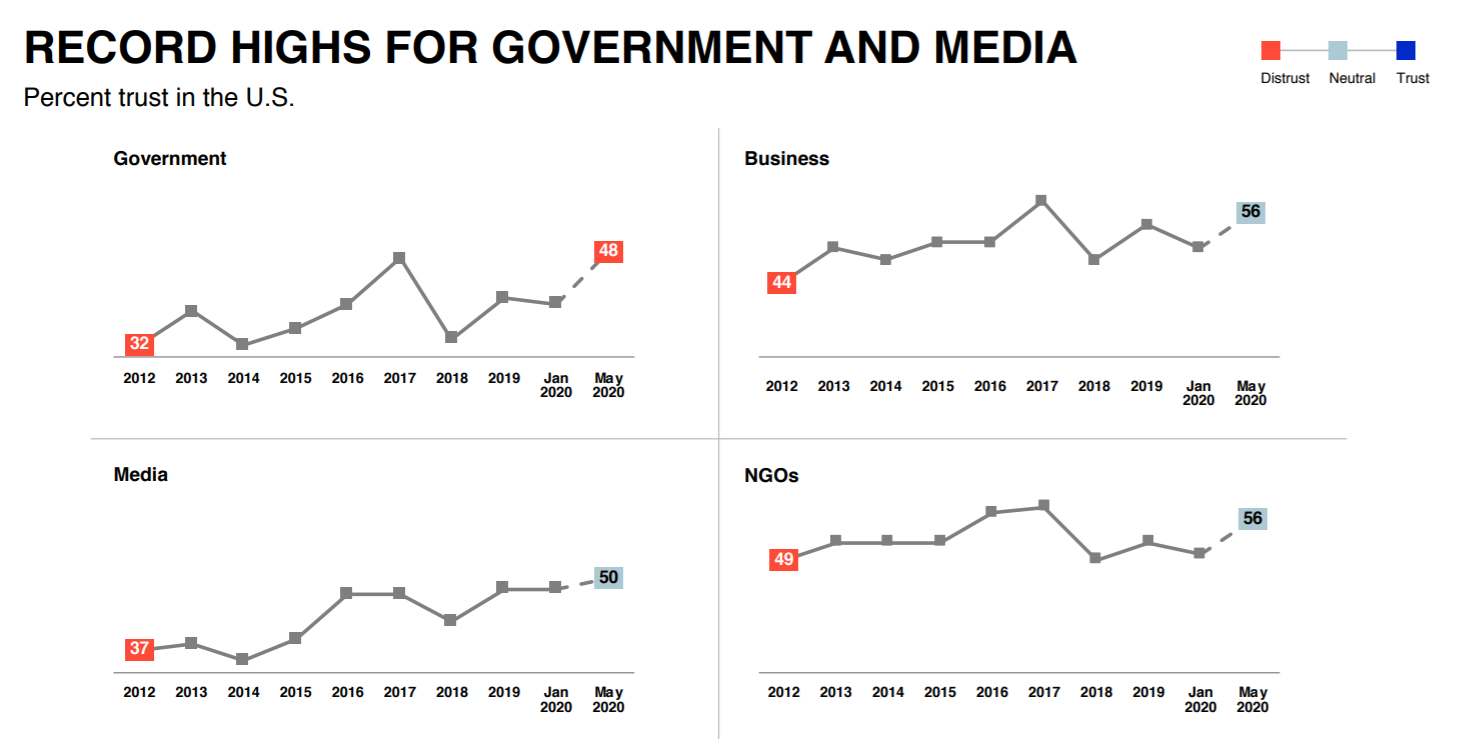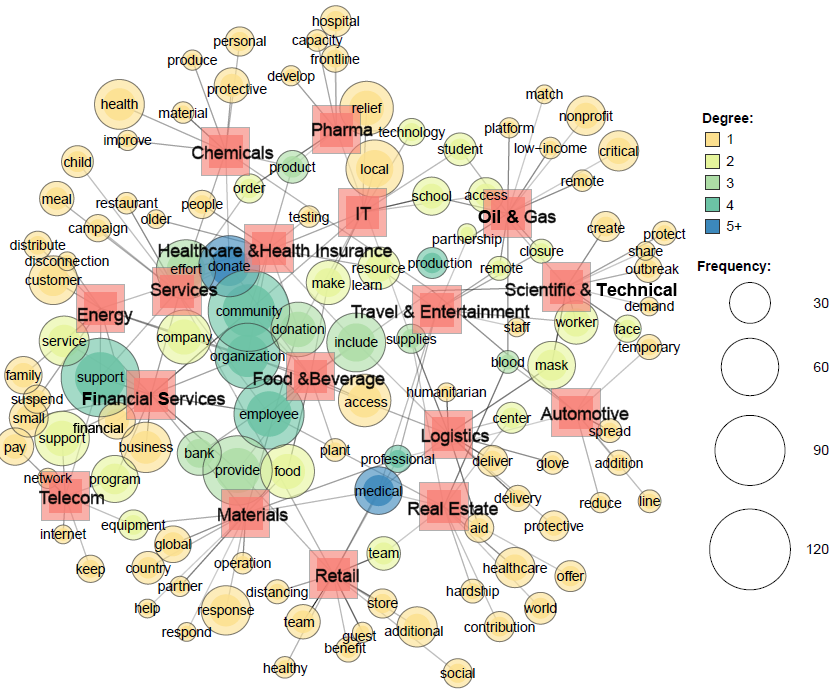RESEARCH BRIEF - To examine whether CSR Activities affect Long-term Stock Returns, researchers studied 6971 observations of common stock of Japanese firms operating globally, along with accounting data and ownership data.
Trusting business to lead COVID-19 response

How much do people trust business to bring us through the COVID-19 pandemic? Well, according to the spring update of the Edelman Trust Barometer, that depends to a great extent on where your home base is.
The recently updated Edelman Trust Barometer found that since January 2020 overall trust has increased, with business, government, NGOs and nonprofits, and media all experiencing record-setting high marks for trust in the 20-year history of the survey. For the first time, government is the most trusted institution globally. Business leaders were deemed to be falling short of expectations. I will admit, I was surprised by these findings. Since early March we at BCCCC have seen companies step forward to contribute to—and sometimes to lead—relief efforts that some would consider to be the rightful purview of government. These efforts have been extensive ranging from procurement of personal protective equipment, to distribution of meals to those experiencing food insecurity, to communicating information and personal safety practices required to navigate the pandemic.
A deeper dive into the data reveals some nuances. First, in all countries except for South Korea, Germany, and India, local government approval is driving the increase in government trust. While government tops the trust list across the 11-country averages, it is less true for some countries—including the US. The corporate focus on getting things done in real time is important and admirable. Communicating commitments is also important, not only to ensure that the allocation of resources is recognized, but also to share effective practices and encourage coordination among relief and recovery actors. Communication is where government actors have excelled and corporate actors have lagged. Taken together these factors suggest that there is an opportunity for companies to communicate more effectively about their important contributions to relief and recovery work.
I am going to focus my remarks here on U.S. and Canadian companies, where the greatest majority of our members are headquartered, but a closer look into the overall results is time well spent if you want to understand what is likely expected of your firm in locations around the world.
In the U.S., business is in the neutral zone and government is in the distrust zone. Business and government are, overall, both in the trust zone in Canada. (See Figures 1 and 2 below.) In both the U.S. and Canada, 60% of respondents believe that CEOs should prioritize aid to communities in their headquarters countries before deploying aid globally, and that CEOs should take the lead on addressing the pandemic rather than waiting for government to set the pace. In both markets, they are given low marks for leading in this crisis.
Figure 1
SOURCE: Edelman Trust Barometer 2020. Spring Update: Trust and the Covid-19 Pandemic. U.S. Findings. https://www.edelman.com/sites/g/files/aatuss191/files/2020-05/2020%20Edelman%20Trust%20Barometer%20Spring%20Update%20U.S..pdf.
Figure 2
SOURCE: Edelman Trust Barometer 2020. Spring Update: Trust and the Covid-19 Pandemic. Canada Findings. https://www.edelman.ca/sites/g/files/aatuss376/files/2020-05/2020%20Edelman%20Trust%20Barometer%20Spring%20Update%20Canada.pdf.
As corporate citizenship professionals, we know that the business community deserves some credit for stepping up to provide relief. At this point, one would be hard-pressed to find a company that is not contributing in some way to pandemic relief and recovery. (See our catalog of Corporate Responses to COVID-19 pandemic relief here). Companies are leading initiatives that range from providing logistics to deliver critical equipment to health professionals to building up the infrastructure needed to support mass testing. While unemployment numbers are rising, businesses are coming up with creative solutions to avoid layoffs, such as job-sharing or furloughing as means to keep employees covered by health insurance even if the company cannot afford a full payroll.
We are seeing trends emerge as the business community is discovering and supporting increasingly critical societal needs that have come out of the pandemic, such as food security and access to education. Firms are also supporting employees with increased pay, enhanced paid sick leave benefits, and employee relief funds to help colleagues cope with hardship.
To help visualize these trends, Figure 3 below is a text analysis derived from the ongoing list in our Corporate Citizenship Perspectives Blog, which captures the activities of hundreds of companies across 16 industry groups. The boxes represent industry groupings. Blue bubbles indicate words used in the communications of five or more industries; in this case, nearly all companies are giving donations to medical relief efforts. Dark green indicates four or more industry groups, in which we see the vast majority of companies prioritizing employees and their local communities. Light green represents three or more industries, yellow two or more, and gold in one.
There is good news to glean from this illustration. Industries are—in many cases—sticking to their knitting and making contributions that they are best suited to make. Chemicals, for example, is focused on donating personal protective gear and products that can be used to protect workers. Services organizations are focused on distributing meals, logistics on moving donations and providing humanitarian shipments, healthcare and health insurance on making infrastructure for testing more robust and communicating health information to the community, and IT and telecoms companies are both communicating public health information and making sure that home-bound families are able to stay connected for work and school, etc.
Figure 3

SOURCE: BCCCC
The good work that is being done is, literally, all over the map. So if your company is already actively involved in responding to the pandemic, how can you raise your profile and gain trust with the consumers and other stakeholders you serve? The answer lies in focus. Prioritize your efforts and frame your communications about them with consideration for the expectations of your key stakeholders. The updated Trust Barometer holds an important guide to what is expected of companies and other institutions right now. I am sharing the U.S.-focused map below. Canada tracks along with this list of expectations in terms of rank ordering, though their expectations are (as usual) higher than ours here in the U.S.
This means prioritizing in your communications to include what people expect to hear from you:
- a description of your commitments,
- how you are helping people to cope through the crisis,
- how you are working to get us back to normal, followed closely by,
- what you are doing to help contain the pandemic.
Figure 4
SOURCE: Edelman Trust Barometer 2020. Spring Update: Trust and the Covid-19 Pandemic. U.S. Findings. https://www.edelman.com/sites/g/files/aatuss191/files/2020-05/2020%20Edelman%20Trust%20Barometer%20Spring%20Update%20U.S..pdf.
Related Content
RESEARCH BRIEF - The study utilized a dataset of 28 globally listed airlines with 420 firm-year observations of ESG data over time.
Check out the latest findings and best practices from BCCCC's Community Involvement Board, comprised of corporate leaders working in corporate giving, community relations, and related roles.
Check out the latest findings and best practices from BCCCC's ESG Reporting Board, comprised of corporate leaders working in sustainability reporting.
Check out the latest findings and best practices from BCCCC's Sustainability in Manufacturing & Retail Board, comprised of corporate leaders whose roles address emerging regulation, changes in consumer preferences, and the need to manage ESG risks and opportunities throughout value chains.
Check out the latest findings and best practices from BCCCC's Professional Services Sustainability Board
Check out the latest findings and best practices from BCCCC's Opportunity, Inclusion & Workforce Engagement Board, comprised of corporate leaders working in inclusion, belonging, and employee engagement roles.
Check out the latest findings and best practices from BCCCC's Health Equity Board, comprised of corporate leaders from a variety of industries, all exploring social determinants of health and efforts to support more equitable health outcomes.


